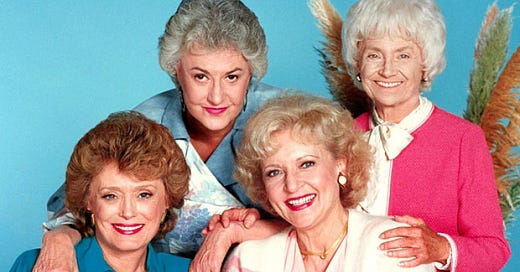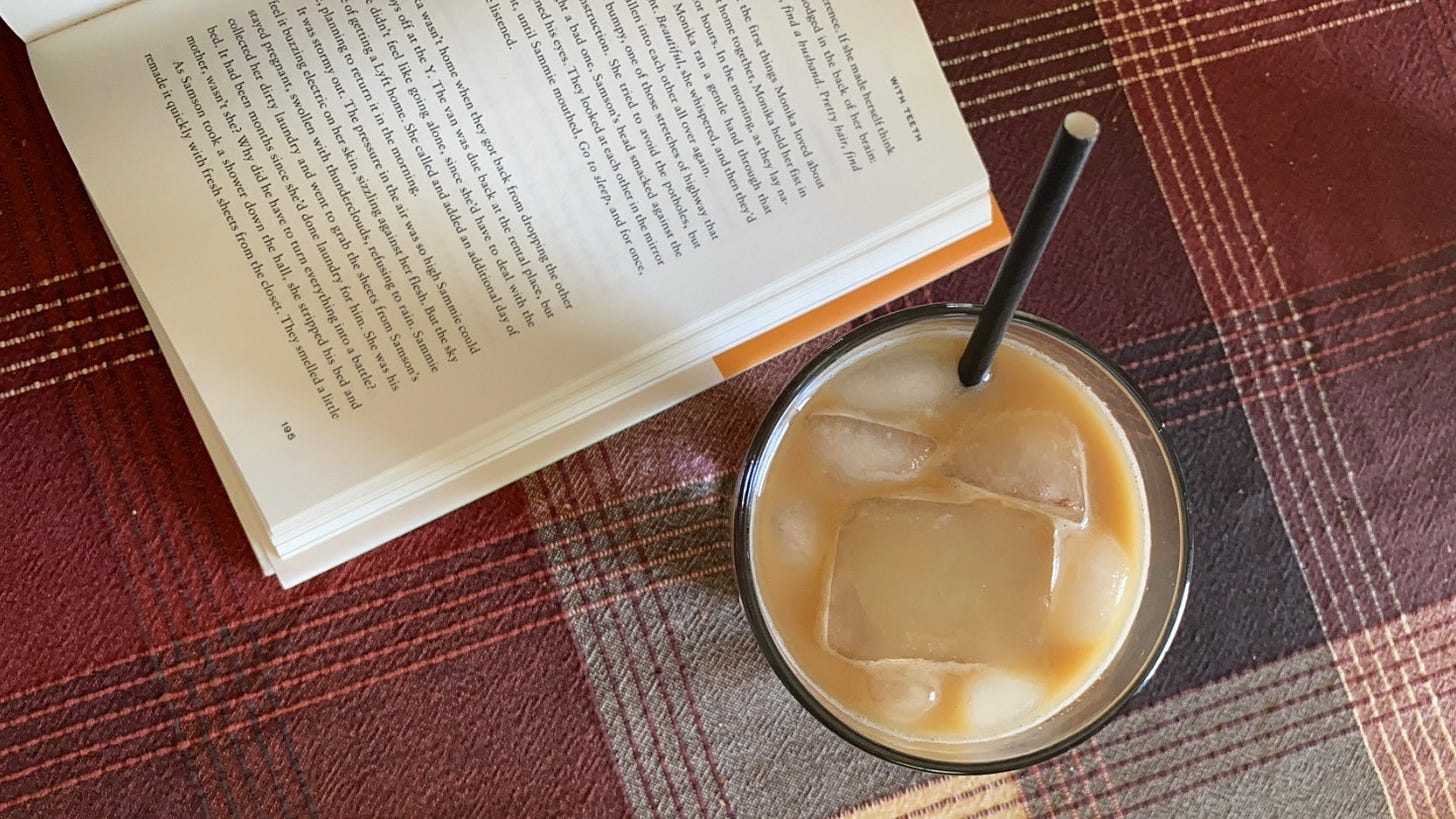'The Golden Girls' May Have Ended but It Will Never Get Old 👵🏻✨
an ode to betty white, aging & women's stories - welcome back to The Slush Pile!
Welcome to month TWO of The Slush Pile, everyone! Since we critiqued last month, today we are celebrating! If you think back to fifteen days ago, December 2021 ended with quite a shock—that is, Betty White passing just seventeen days before her 100th birthday. Given how much I’ve been watching her on-screen and researching her life, as well as her startling resemblance to my late maternal grandmother (not to mention that they were born the same year!), I was completely rocked by the sudden loss which at her age, perhaps I shouldn’t have been. Still, I could think of no better time to honor this incredible woman by reflecting on her arguably most well-known sitcom The Golden Girls, which aired on NBC from 1985 to 1992. Created by Susan Harris, the show follows four older women in their 50s, 60s, and 80s living together under one roof in Miami. Navigating love, sex, the trauma of dead and downbeat husbands, health issues, their kids chasing their own lives, and growing older, TGG remains a historic, groundbreaking show for the representation of older women in mainstream media.
Because I wasn’t born until 1999, I obviously didn’t grow up with TGG while it originally premiered on TV. But just like Friends, Parks & Rec, and similarly beloved sitcoms, the show received a second life when Hulu secured the licensing and streaming rights, making the show easily accessible to the new and old generations alike.
At 22, I have no doubt that I am not this show’s intended demographic, both because of the ages of its ensemble cast and the specific, often unfamiliar pop culture references and name drops (am I the only one who had to Google ‘Buddy Holly’?). And yet there’s something irresistible and calming about watching it when I’m searching for a bit of easy viewing. The punchlines are comfortingly predictable, the plots hilarious, the sparkling romances found and then dropped within the same episode to fit its episodic tendencies.
When I first watched TGG in the summer of 2019, I was hooked from the beginning for more reasons than one: Dorothy’s wit and sarcasm, Blanche’s exaggerated Southern accent and poise, Sophia’s stomach-hurting one-liners, and of course, Rose’s St. Olaf stories and casual but ridiculous-sounding Scandinavian lingo. By the time I reached the finale with tears in my eyes and heartache in my chest, these ladies had long since become my family.

And by the time I reached my fourth viewing of the show in its entirety in 2021 (as we speak, I’m halfway through Season 6!), TGG had attained a specific, personal place in my life; I’ve found it a whole lot more relatable than you would think.
Not only am I lucky enough to call my 70s-aged aunt my roommate but I’m also constantly surrounded by other older people. When not with friends of my own age, which has become limited since the start of the pandemic, I’m seeing my parents who are both in the same age range as TGG ladies. Often my other aunt and uncle, also in their 70s, will join in on the fun and suddenly I’ll find myself in conversations about sciatica, liver spots, thinning hair, adult-aged children, being grandparents, and what kind of mop brand is the best kind to use for hardwood floors. The Golden Girls is more than just another 80s show—for me, it’s real life.
It hits so close to home, in fact, that there was a time after my abuela’s passing in February 2021 when I couldn’t watch a single episode without wanting to burst into tears. Seeing Sophia Petrillo, who then also resembled my grandmother with her white cloud-puff of hair and that signature older person shuffle, walking around healthy and alive on my screen was just too much to take for a while.
And while every one of the four leading ladies is necessary to the show’s success, Betty’s character Rose Nylund—an icon in her own right—is a large reason why the show holds so much magic for me.

On the surface, it’s easy for her friends and even the audience to dismiss Rose for her naivete, goofiness, and lack of self-awareness and understanding of innuendos. But in Betty’s hands, Rose has layers, secrets, and complexities. She has her moments of genuine fear as well as bravery, of being able to roll with her friends’ snide remarks and then other days, snap back with a quick retort of her own. While she’s more than entertained by a handmade sock puppet, adopted animal, a nonsensical St. Olaf story, and her Scandinavian dishes, she’s also not one to shy away from sexual urges and fantasies (like the time she confesses how weddings ‘make her hot’), even with her embarrassment about certain technical terms. Like the real Betty herself, Rose is sweet and nurturing with the shadow of a wild side.
All this in a society that tosses women aside once they’re no longer sexually appealing. In an industry where the majority of female actors are considered doomed to lose their sex appeal at 35 and are relegated to supporting roles of “Grandmother” after the age of 50, while men continue to lead films until their dying days. Both then and now, TGG isn’t important just because it’s funny, but because in this universe, older women remain the main characters of their own stories. They answer that which no one before seemed inclined to ask: what happens after your children leave you, after your husband dies or divorces you? How do you still thrive while growing older? How do you continue living boldly when the world doesn’t value you as anything more than a mother or widow or divorceé? The show isn’t interested in young people growing up but in aging people growing older.
Of course, I won’t pretend like that show isn’t a product of its time. While TGG was groundbreaking for its depictions of AIDs, LGBTQIA+ issues, and female sexuality, it has its sticky moments when it comes to commenting on anything outside of the cis, straight, white, abled experience. People much smarter than me have done the work of unpacking its problematic takes on race, religion, and disabilities but it doesn’t take a lot of reading or watching the show to figure out how their sensibilities are different from our own.
Still, I’m grateful for what this show has offered since my first viewing: from lazy mornings in bed to dinnertime entertainment, The Golden Girls has given me a place to rest, laugh, reminisce, and call home. Thank you to Bea, Rue, Estelle, and Betty for the joy and laughter you have brought to my life every time I’ve watched this show and every time following. I owe you all one.
And finally, all my love to Betty White and happy early birthday. Stay golden, my love.
notes from the writer’s desk ✍️
my favorite recently pub’d pieces:
Q+A With Zoraida Córdova, Author of ‘The Inheritance of Orquidea Divina’, Latina Media
Q+A With Emilly Prado, Author of ‘Funeral for Flaca’, Latina Media
Centering Brown Stories: An Interview With Author Daphne Palasi Andreades, Unpublished Magazine
this is the place, Lines & Breaks, A Literary Journal from WriteGirl
glorious, Alebrijes Review
updates:
I’ve finally begun making videos on TikTok! Follow me for TikToks about reading, writing, pop culture, and more—follow + watch here!
I also review books on my Bookstagram account @sofieschoice - if you’d like to send me an ARC for an honest review, please email or DM me! I enjoy traditionally published, self-published, novels, collections, chapbooks, and just about everything in between.
As you read this, I’m currently in Mexico on the writing residency Under the Volcano as the 2022 Sandra Cisneros Fellow. Read this newsletter from WriteGirl to learn more about the program, the fellowship, and my work for and with this incredible nonprofit!
other stories i’m loving 📖
currently reading:
A Body Across Two Hemispheres by Victoria Buitron
currently watching:
S7 of The Golden Girls
S5 of Bob’s Burgers
assorted Disney Channel Original Movies from the 2010s
currently listening to:
“Daydream” by Johnny Orlando
S.OM.E. EP by DAISY




